NEWS
30 Little-Known Facts That Make the Kentucky Derby Unforgettable
Published
8 months agoon
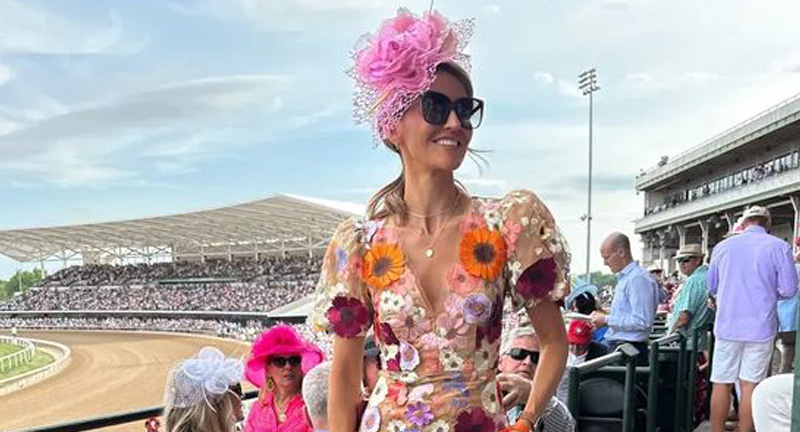
Pinterest
The Kentucky Derby, known as ‘The Most Exciting Two Minutes in Sports,’ is a yearly horse racing event in Louisville, Kentucky, and is the longest-standing sports event in the United States. Established in 1875, the Derby has firmly taken root in American culture, representing tradition, pageantry, and competitive spirit. The event draws thousands of spectators annually, including celebrities and horse racing fans, to Churchill Downs to experience the spectacle. It is renowned for its fashion, especially the elaborate hats worn by attendees, and the iconic mint julep cocktail served throughout the event. As part of the Triple Crown series, the Kentucky Derby remains a highlight of thoroughbred racing, celebrating triumph and pageantry that has enthralled audiences for generations.
COVID-19’s Impact on the Derby
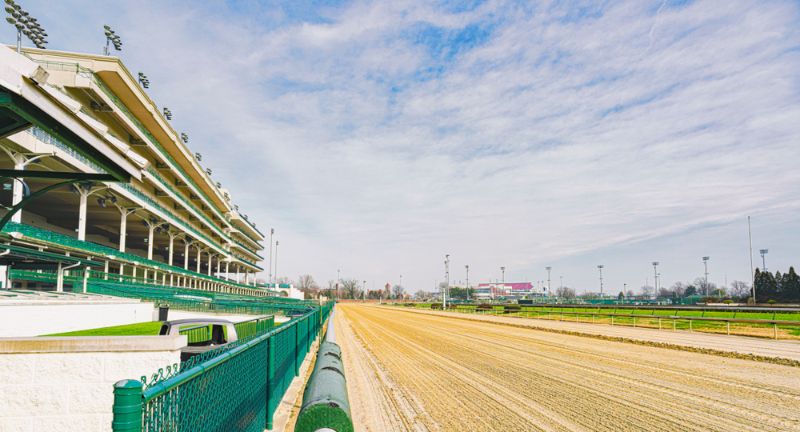
Shutterstock
The 2020 Kentucky Derby was postponed to September for the first time in its history due to the COVID-19 pandemic. This unprecedented change broke the tradition of running the race on the first Saturday in May. The postponement and subsequent adjustments highlighted the challenges and resilience of the Derby during a global crisis. This event will be remembered as a historic moment, reflecting the impact of the pandemic on major global sporting events.
No Repeat Winners
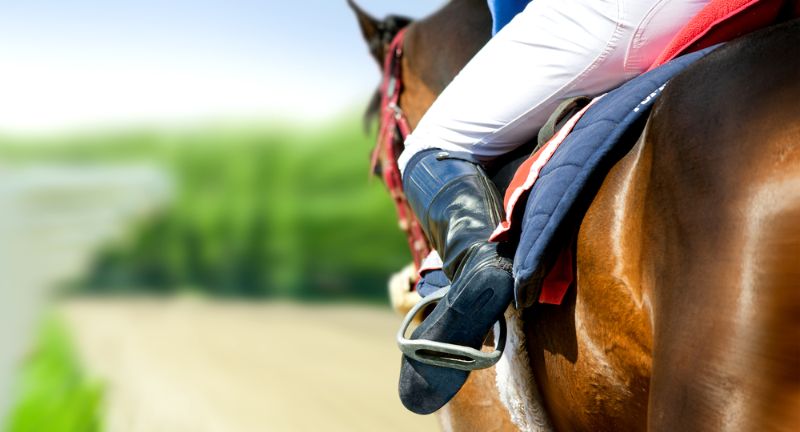
Shutterstock
The Kentucky Derby stands out because it is restricted to three-year-old horses only, meaning no horse can win the race more than once. This rule guarantees new champions annually and maintains a fresh and unpredictable competition. The age limit’s exclusivity enhances the challenge and allure of the Derby. This rule underscores the brief window of opportunity for each young contender to achieve glory.
Innovations at the Kentucky Derby Starting Gate
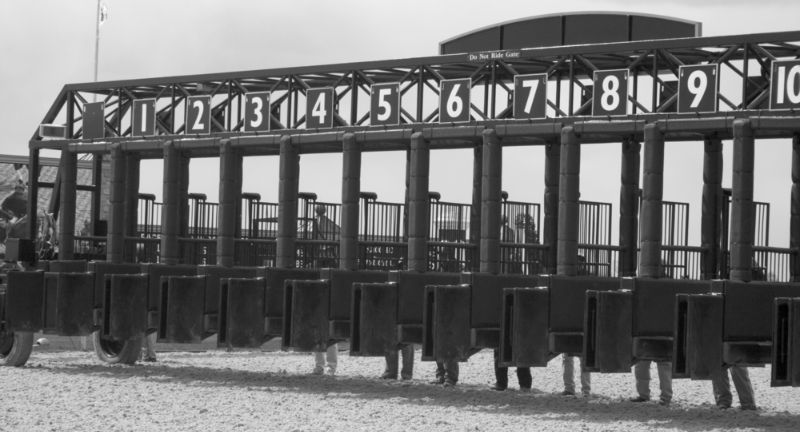
Shutterstock
In 2020, the Kentucky Derby unveiled a new starting gate designed to accommodate all 20 horses in a single, straight line. This innovation aims to ensure a fairer start for all competitors, reducing the chaotic jostling often seen with the old gate. The new gate marks a significant advancement in racing technology, enhancing both the safety and competitiveness of the Derby. These improvements reflect a commitment to modernizing the event while preserving its rich traditions.
The Mint Julep Tradition
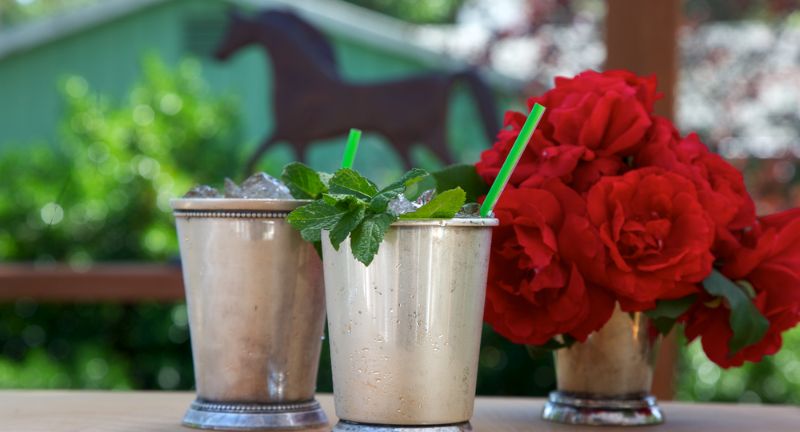
Shutterstock
During the Kentucky Derby weekend, more than 120,000 mint juleps are served at Churchill Downs, making this cocktail a core element of the celebration. Comprised of bourbon, mint, sugar, and water, the mint julep has been a Derby fixture for many years. This drink not only satisfies thirst but also ties racegoers to the deep-rooted traditions of the South. Savoring a mint julep at the Derby is a beloved ritual that enriches the experience of this historic event.
The Kentucky Derby Festival

Shutterstock
The Kentucky Derby Festival kicks off two weeks prior to the main race, featuring over 70 events such as parades, races, and fireworks. This vibrant community celebration heightens the excitement and anticipation as the Derby approaches. It’s a major cultural event that draws local residents and visitors, highlighting the warm spirit and hospitality of Louisville. The festival offers a wide array of activities for people of all ages and interests, solidifying its place as a pivotal part of the Derby season.
Record Derby Attendance
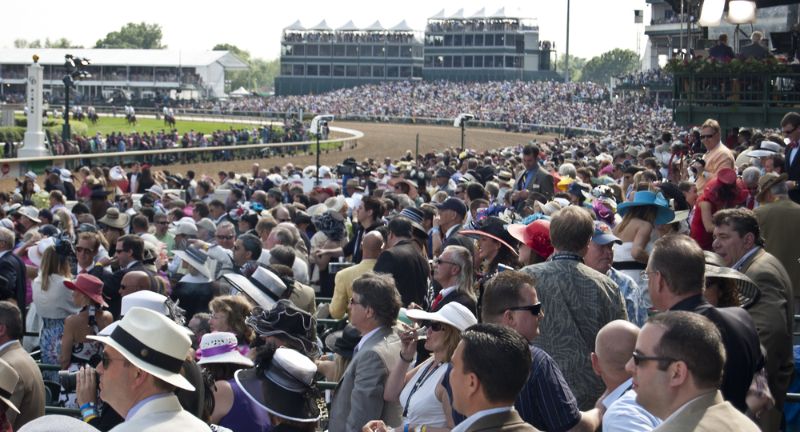
Shutterstock
In 2015, the Kentucky Derby reached a milestone in attendance, with 170,513 people converging at Churchill Downs to witness the iconic race. This record-breaking turnout underscores the lasting appeal of the Derby and its capacity to draw large audiences annually. The significant attendance numbers enhance the event’s vibrant atmosphere, providing a deeply engaging experience for those present. Additionally, the large crowds highlight the Derby’s esteemed position in American sports culture.
Celebrities at the Derby
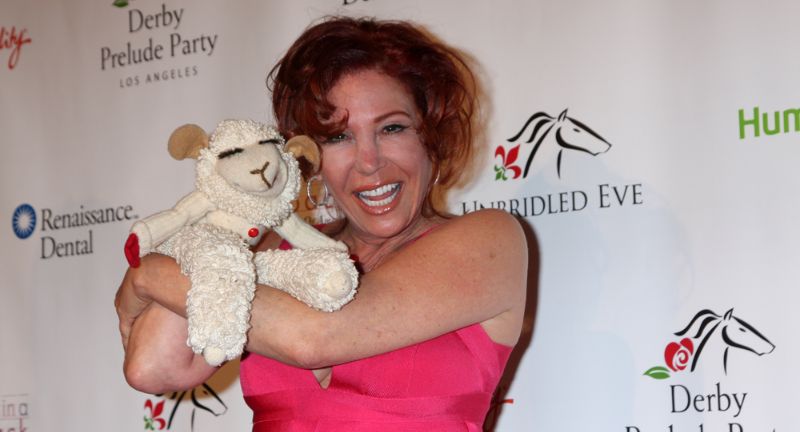
Shutterstock
The Kentucky Derby is not only a sporting event but also a significant social gathering, attracting numerous celebrities each year. Regular attendees include stars like Kim Kardashian and Tom Brady, who add a layer of glamour and publicity to the event. The presence of these celebrities helps draw media attention and enhances the global profile of the Derby. This mix of high-profile attendees and exciting horse racing action creates a unique and vibrant atmosphere at Churchill Downs.
Legendary Triple Crown Victors
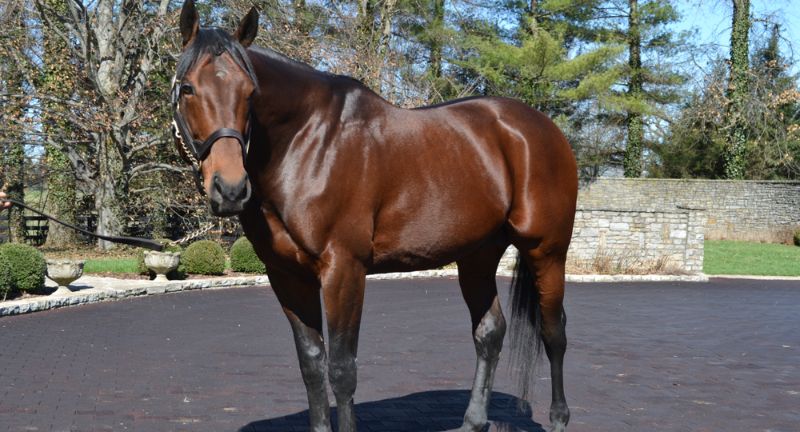
Shutterstock
Renowned Kentucky Derby champions such as Secretariat, American Pharoah, and Justify have all succeeded in clinching the Triple Crown, which includes the Kentucky Derby, the Preakness Stakes, and the Belmont Stakes. These icons are lauded for their remarkable accomplishments in thoroughbred racing. Their triumphs at the Kentucky Derby paved the way for their monumental status in horse racing lore. Each of these horses has made a lasting impact on the sport, motivating future generations of racers and enthusiasts.
Youngest Winning Jockey
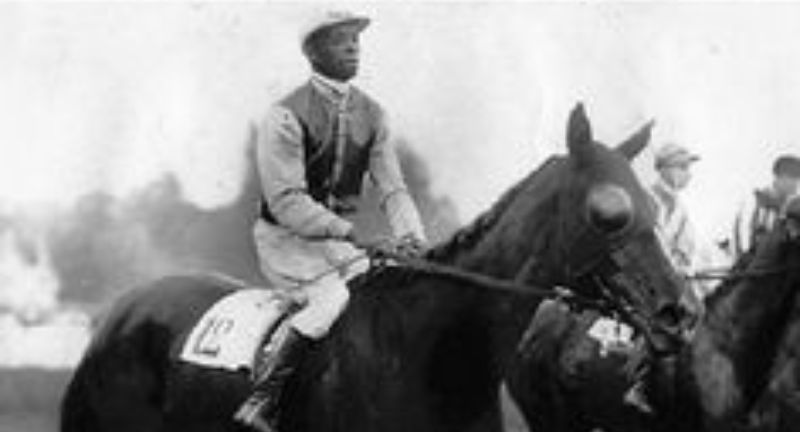
Pinterest
Alonzo ‘Lonnie’ Clayton holds the record as the youngest jockey to win the Kentucky Derby, achieving this feat at just 15 years old in 1892. His victory aboard Azra demonstrated remarkable skill and composure beyond his years. Clayton’s success is a testament to the youthful talent that has shaped the history of the Derby. His record still stands, highlighting the extraordinary achievements that can emerge in the world of horse racing.
Secretariat’s Unmatched Speed
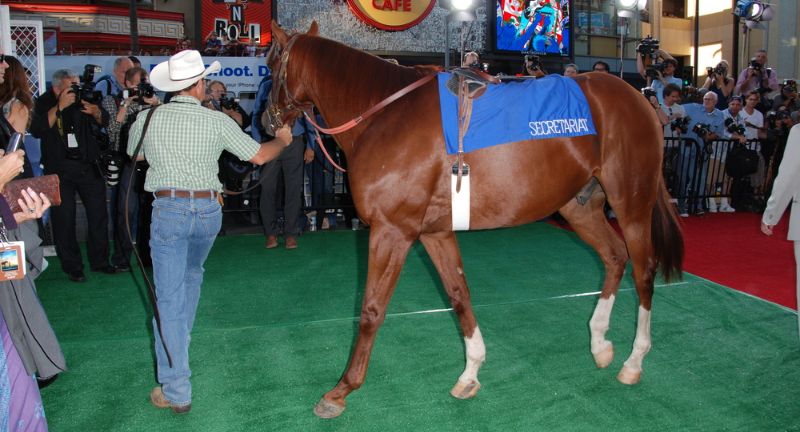
Shutterstock
In 1973, the legendary thoroughbred Secretariat made history at the Kentucky Derby by clocking an incredible time of 1 minute and 59.4 seconds. This remarkable achievement remains the fastest time ever recorded in the Derby’s history, highlighting Secretariat’s exceptional speed and racing prowess. His awe-inspiring performance captured the hearts of audiences and established a formidable standard for future competitions. To this day, Secretariat’s legacy endures, inspiring and impacting the horse racing world.
The First Kentucky Derby
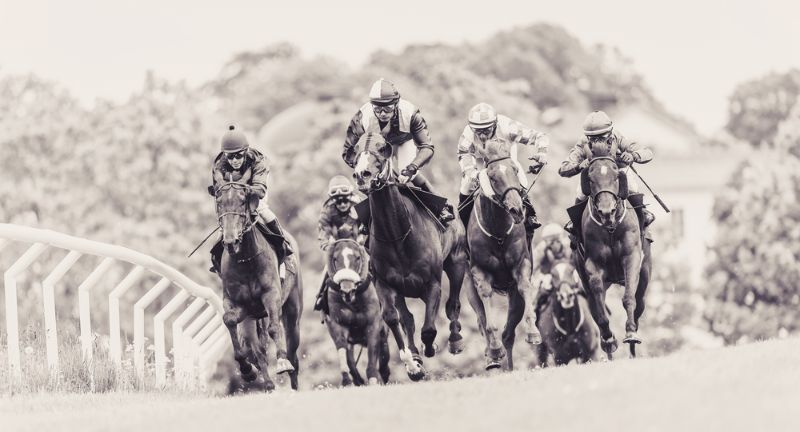
Shutterstock
The inaugural Kentucky Derby took place in 1875, initiating a longstanding American tradition. Aristides, a colt ridden by African American jockey Oliver Lewis, was the winner of this historic race. This event laid the foundation for a competition that would increase in popularity and prestige over the years. The triumph of the first Derby played a crucial role in establishing Churchill Downs as a legendary racetrack in Louisville, Kentucky.
Infrequent Disqualifications in the Kentucky Derby
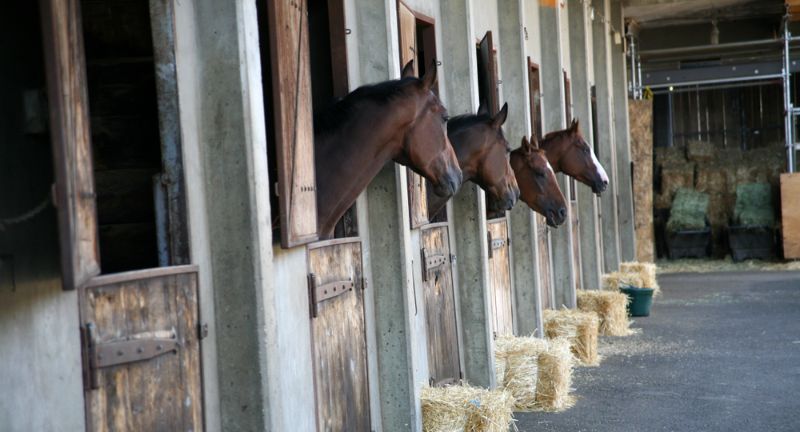
Shutterstock
Disqualifications in the Kentucky Derby are uncommon but have significant impacts when they do happen. The first horse to be disqualified for a medication violation after winning the race was Dancer’s Image in 1968. These incidents underscore the strict enforcement of rules designed to uphold the competition’s integrity. Such rare but crucial decisions are essential to ensure fairness and credibility in the Derby, preserving its prestigious reputation.
The Introduction of Photofinish Technology
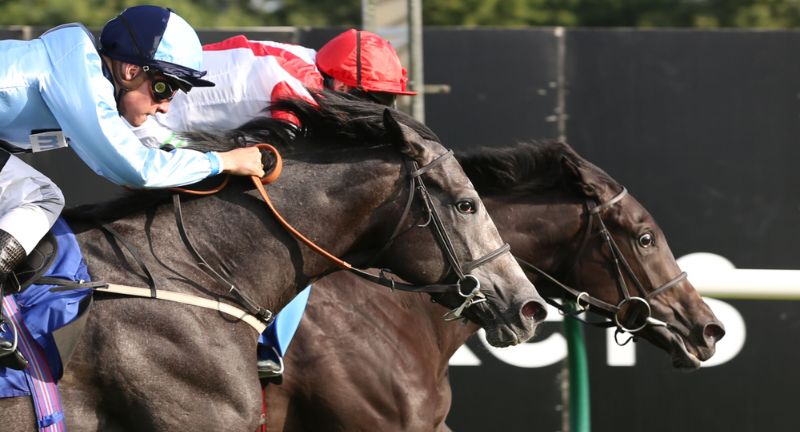
Shutterstock
In 1948, Churchill Downs installed its first photofinish camera to accurately determine the winner of close races. This technological advancement was crucial for providing clear and fair results in tightly contested finishes. Photofinish cameras have since become an essential tool in horse racing, ensuring the integrity of the sport. The adoption of this technology at the Kentucky Derby underscores its commitment to fairness and precision in horse racing.
Role of African American Jockeys
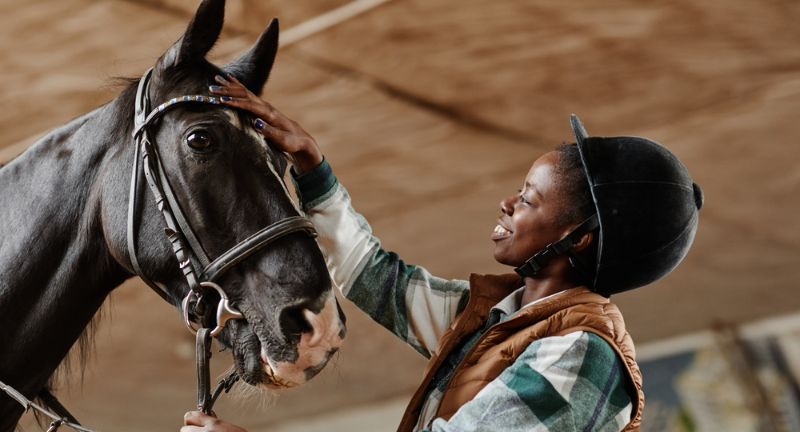
Shutterstock
In the early years of the Kentucky Derby, African American jockeys were dominant figures, claiming victory in 15 of the first 28 races. Their skill and prowess were pivotal in shaping the early success of the Derby. Despite their contributions, racial discrimination later marginalized these athletes from the sport they once dominated. The legacy of these early jockeys remains a significant, though often overlooked, part of the history of American horse racing.
Iconic Twin Spires
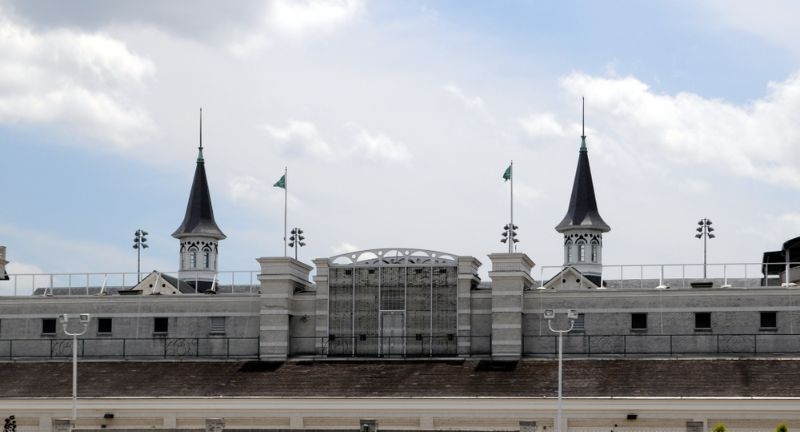
Shutterstock
Built in 1895, the Twin Spires of Churchill Downs stand as the most recognizable emblem of the Kentucky Derby. Designed by Joseph Dominic Baldez, these architectural features were initially meant to be purely ornamental. Over the years, they have evolved to represent the heritage and prestige of the Derby itself. Prominently displayed in logos and imagery related to the race, the Twin Spires underscore their iconic status.
The Emotional Anthem of the Kentucky Derby
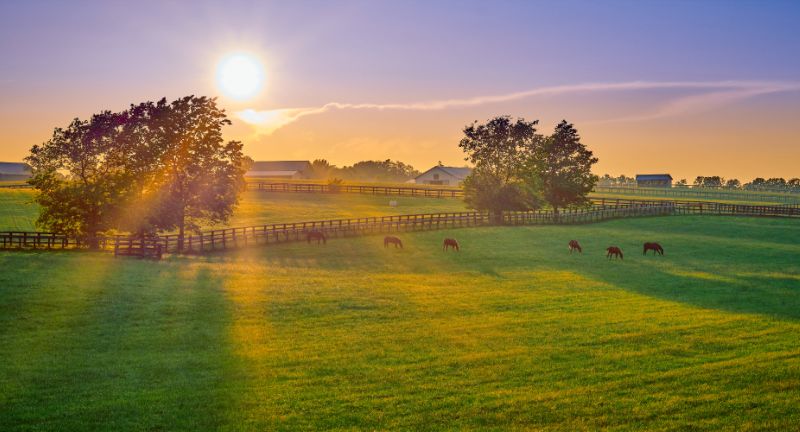
Shutterstock
At Churchill Downs, as the horses are showcased before the audience, the iconic anthem ‘My Old Kentucky Home’ plays, creating a touching moment of unity and anticipation. This song, rendered by a university marching band, elicits a powerful emotional reaction from attendees, encapsulating the essence of Kentucky and the Derby. The tradition of this song spans decades, reinforcing Kentucky’s cultural heritage and deep-seated pride. This musical tribute is a treasured element of the Derby experience, enriching the ceremonial facets of the event.
High Stakes Betting
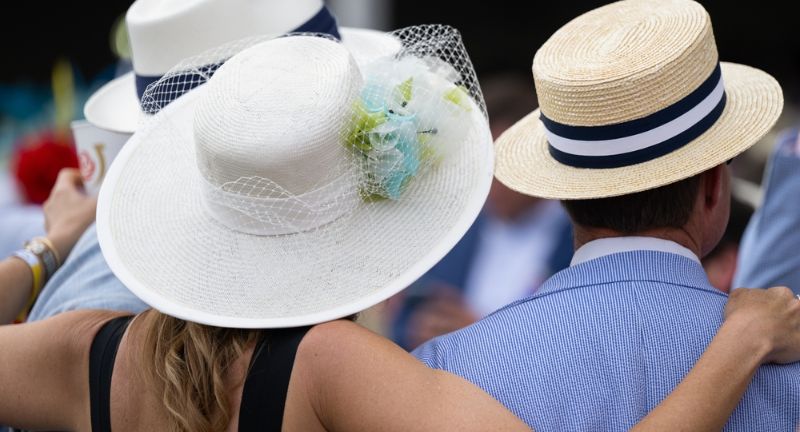
Shutterstock
Betting plays a significant role in the Kentucky Derby experience, with 2019 marking a record high in wagers at over $209 million on Derby Day. This impressive number highlights the event’s immense popularity and economic influence. Participants from across the globe place bets, amplifying the excitement and unpredictability of race results. The high stakes involved in Derby betting not only elevate the race’s thrill but also provide substantial contributions to the local economy.
Derby Fashion Statements
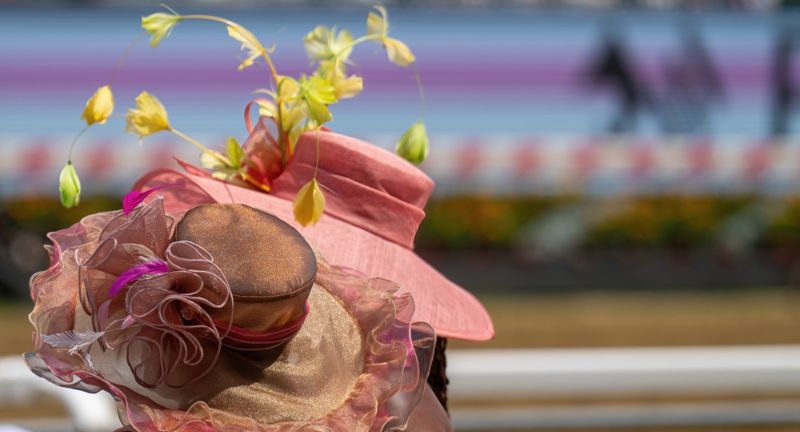
Shutterstock
The tradition of donning extravagant hats at the Kentucky Derby originated as a symbol of social status among women. Over the years, this custom has transformed into a wider celebration of fashion and individuality, drawing global attention. Derby day showcases a vibrant assortment of hats, from elegant to extravagant, each representing the wearer’s personality and style. This distinctive fashion tradition adds an additional layer of excitement and glamour to the race day festivities.
The Derby’s Nicknames
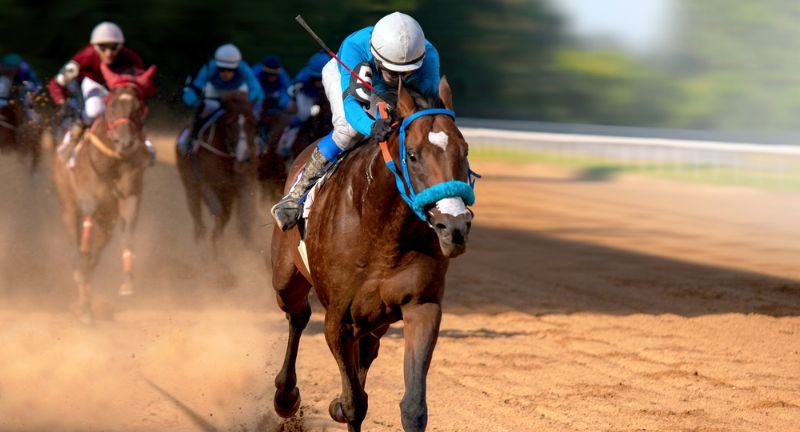
Shutterstock
The Kentucky Derby is affectionately known as ‘The Most Exciting Two Minutes In Sports’ and ‘The Fastest Two Minutes in Sports.’ These nicknames reflect the intense and fleeting nature of the race, which is often decided in just a couple of minutes. The excitement that builds up around this short race duration is palpable, as the outcome can change in mere moments. This brevity adds to the thrill and anticipation that makes the Derby a must-see event each year.
Derby Pie: A Delicious Tradition
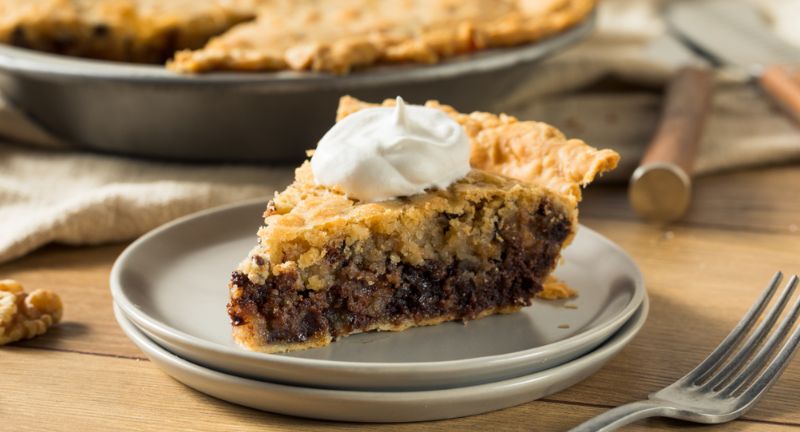
Shutterstock
Derby Pie, a rich tart filled with chocolate chips and walnuts, is a traditional dessert enjoyed at Kentucky Derby parties. This beloved treat was created in the 1950s and has become a staple at celebrations during the Derby season. Its unique blend of flavors captures the festive spirit of the event. Enjoying a slice of Derby Pie is a tasty way to partake in the culinary traditions of the Kentucky Derby.
Trailblazing Female Jockeys
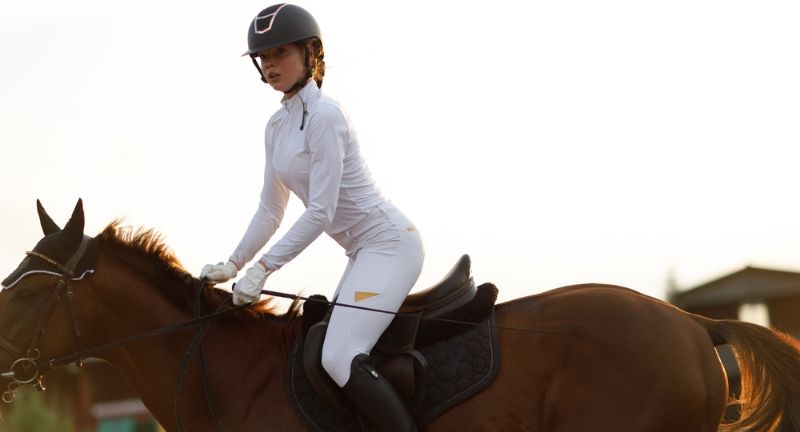
Shutterstock
In 1970, Diane Crump broke new ground by becoming the first female jockey to ride in the Kentucky Derby. Her involvement was a monumental step forward in the pursuit of gender equality within the realm of horse racing. While a female jockey has yet to clinch a Derby victory, Crump’s pioneering spirit has opened doors for many other women in the sport. The presence of female jockeys in the Kentucky Derby continues to challenge and redefine the norms of this historically male-dominated field.
Economic Impact of the Derby
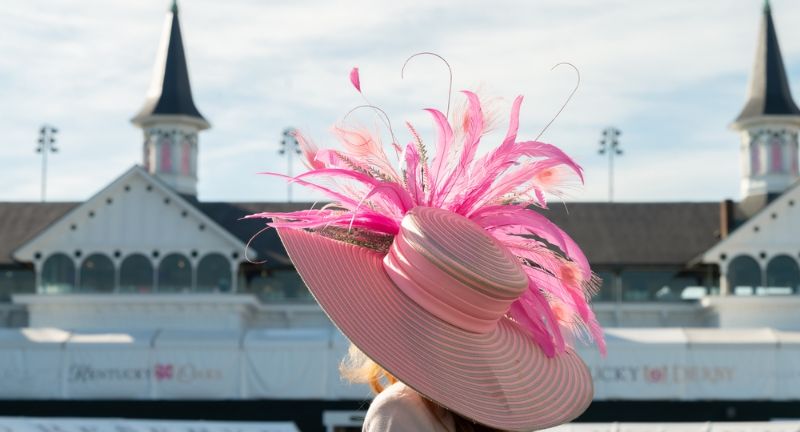
Shutterstock
The Kentucky Derby generates approximately $400 million in economic impact for the Louisville area each year. This highlights the Derby’s role not just as a sports event, but as a major economic driver. The influx of visitors and media attention boosts local businesses and tourism, supporting the economic health of the region. The Derby’s capability to attract large crowds and substantial betting adds to its financial importance, making it a significant date on Louisville’s calendar.
Historic Wins in the Kentucky Derby
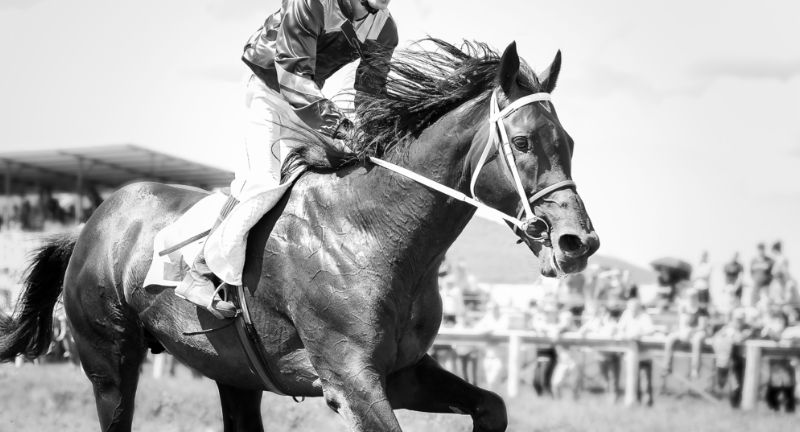
Shutterstock
The Kentucky Derby has witnessed extraordinary victories, with the record for the largest winning margin standing at 8 lengths. This remarkable achievement was first accomplished by Old Rosebud in 1914 and later equaled by Johnstown in 1939. These outstanding performances highlight the unpredictable and exciting nature of the race, cementing the Derby’s status as an exhibition of some of the finest thoroughbreds in horse racing.
The Winner’s Garland
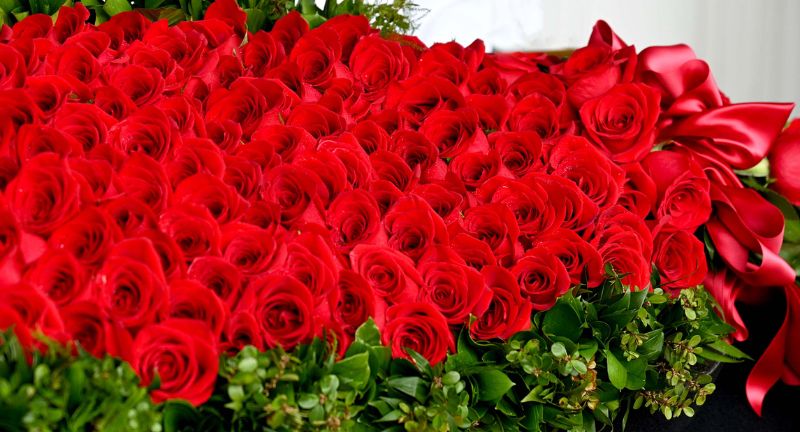
Shutterstock
The garland of roses, which adorns the winning horse at the Kentucky Derby, stands as a powerful emblem of triumph and accomplishment. Consisting of over 400 red roses, this garland weighs more than 40 pounds and is meticulously crafted the night before the race. This cherished tradition began in 1932, when the first floral garland was awarded to Burgoo King, the Derby winner. So integral is this symbol to the event that the Kentucky Derby is often called ‘The Run for the Roses.’
Millionaire’s Row
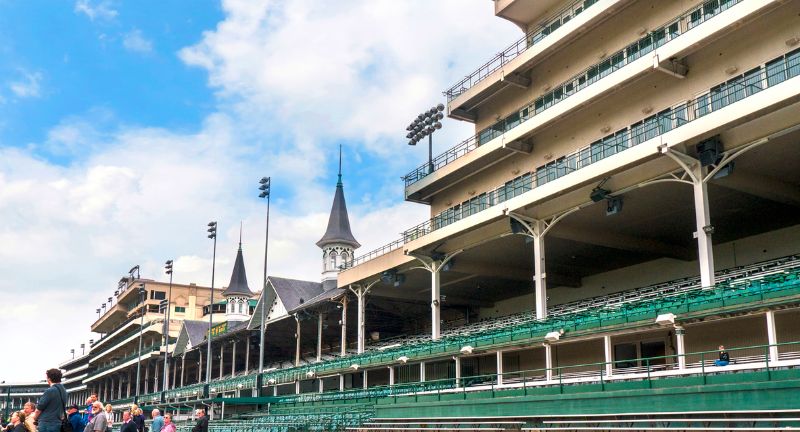
IStock
Millionaire’s Row is the luxurious seating area at Churchill Downs where celebrities and wealthy patrons watch the Kentucky Derby. This exclusive section offers the best views of the racetrack, along with premium dining and service. Being seen on Millionaire’s Row is as much a part of the Derby experience as the race itself, often garnering as much attention for the celebrity sightings as for the action on the track. The allure of this area highlights the Derby’s status as a prestigious social event.
Kentucky Derby Thrives Amid Prohibition

Shutterstock
Despite the constraints of Prohibition, the Kentucky Derby flourished and even grew in popularity during this period. This resilience highlights the Derby’s deep cultural significance and its ability to unite people even under restrictive conditions. The event served as a brief respite and celebration that defied the temperance movement. Today, the Derby continues to be celebrated with plenty of spirits, commemorating its survival and prosperity through challenging times.
Historic Longshot Victories
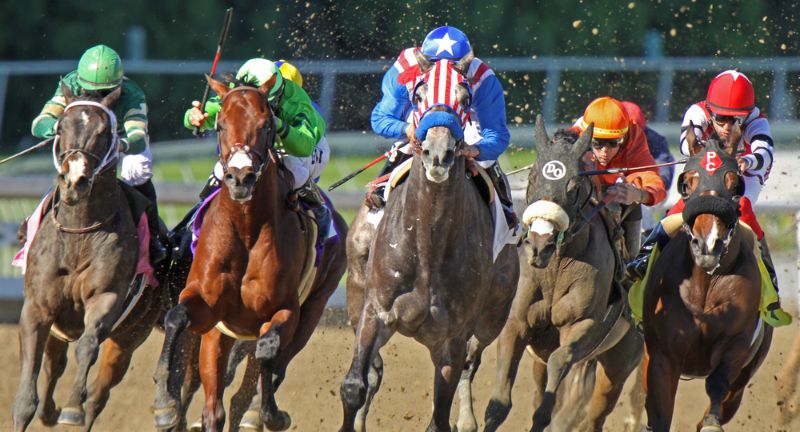
Shutterstock
The Kentucky Derby has seen some remarkable upsets, such as the momentous win by Donerail in 1913, who triumphed with odds of 91-1, marking the biggest longshot victory in the race’s history. These surprising wins introduce a thrilling element of unpredictability and excitement to the event. Longshot winners quickly become legends, captivating fans and bettors alike. These extraordinary underdog tales enhance the rich and storied history of the Kentucky Derby.
The Naming of Churchill Downs
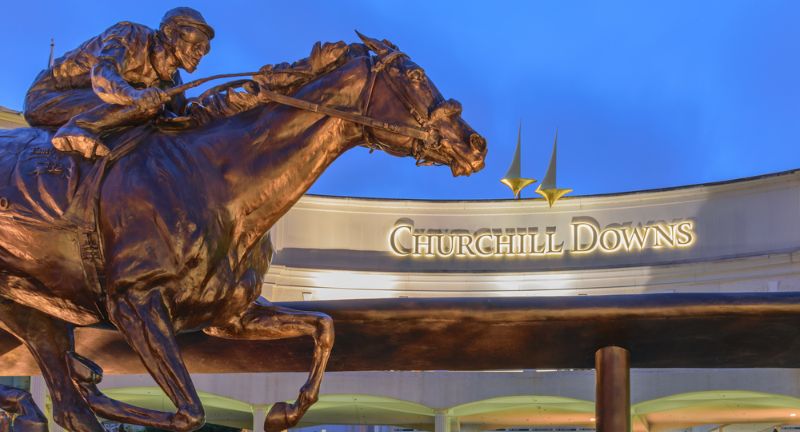
Shutterstock
Churchill Downs, the iconic racetrack known for hosting the Kentucky Derby, was originally opened in 1875 and officially named in 1937. Named after its founders, John and Henry Churchill, who donated the land for its construction, Churchill Downs has become synonymous with premier thoroughbred racing. It stands as a rich tradition of sport and grand spectacle, evolving into a symbol of American horse racing history.
Worldwide Coverage of the Kentucky Derby

Shutterstock
The Kentucky Derby’s international allure is demonstrated by its broadcast in more than 200 countries globally. This wide-reaching coverage enables millions of fans to partake in the thrill of the race, regardless of their location. The global broadcast broadens the Derby’s viewership and solidifies its status as a leading horse racing event. Reaching a worldwide audience highlights the universal charm and cultural importance of the Kentucky Derby.
Conclusion
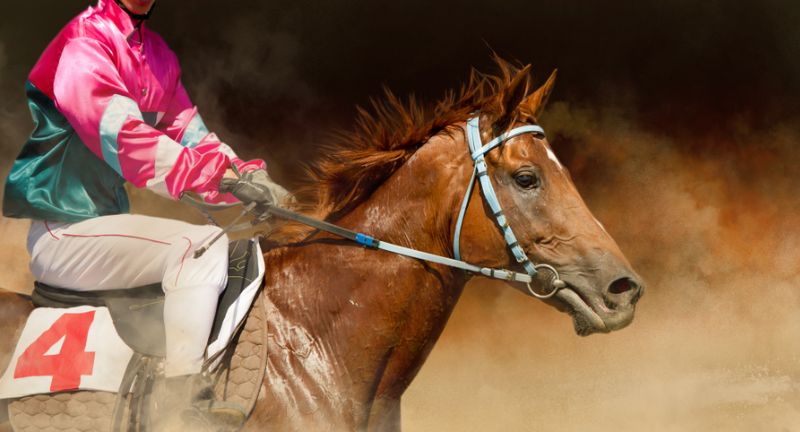
Shutterstock
Each year, as the dust settles on the track at Churchill Downs, the Kentucky Derby continues to leave a lasting impression on spectators and participants alike. This storied race not only tests the prowess of the competing thoroughbreds but also celebrates the rich traditions that have shaped it over the centuries. The thunderous applause of the crowd and the elegant display of Derby fashion each contribute to the unique tapestry of this historic event. The Derby is more than just a race; it’s a cultural phenomenon that encapsulates the essence of American spirit and sportsmanship. Looking forward, the Kentucky Derby will undoubtedly continue to be a beacon of horse racing excellence, drawing new fans and honoring its legacy with each passing year.
ADVERTISEMENT - CONTINUE BELOW
About Money+Investing
Money + Investing provides our community with the latest personal and business finance news from around the world. We publish money saving and earning tips to help you make smartier investing decisions. We're inspired by exploring and providing new ways for our audience to achieve financial freedom. We can't wait to share all of our exciting deals, guides and reviews to help you live your financial life to the fullest.
More Money + Investing
-


Snowflakes and 17 Conservative Stereotypes That Drive Democrats Up the…
-


20 WWII Military Marvels That Redefined Warfare
-


20 Surprising Effects Being “Woke” Has On Your Mental Health
-


21 Items Savvy Shoppers Skip
-


25 Reasons Employers Hesitate to Hire Gen Z Workers
-


24 Items That Are Too Pricey for Shoppers Now
-


20 Sneaky Habits That Could Sabotage Your Retirement
-
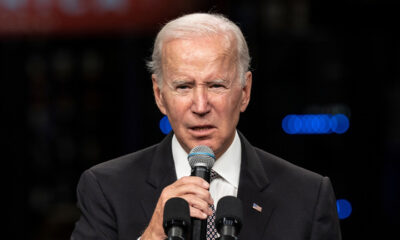

Biden Aims for Historic High with 44.6% Capital Gains Tax…
-


Want the Job? Avoid Asking These 22 Interview Questions
-


15 Spending Habits That Shout ‘I’m Flat Broke!’
-


15 Things You Should Never Do At A Funeral
-


25 Genius Staging Tips to Speed Up Your Home Sale
